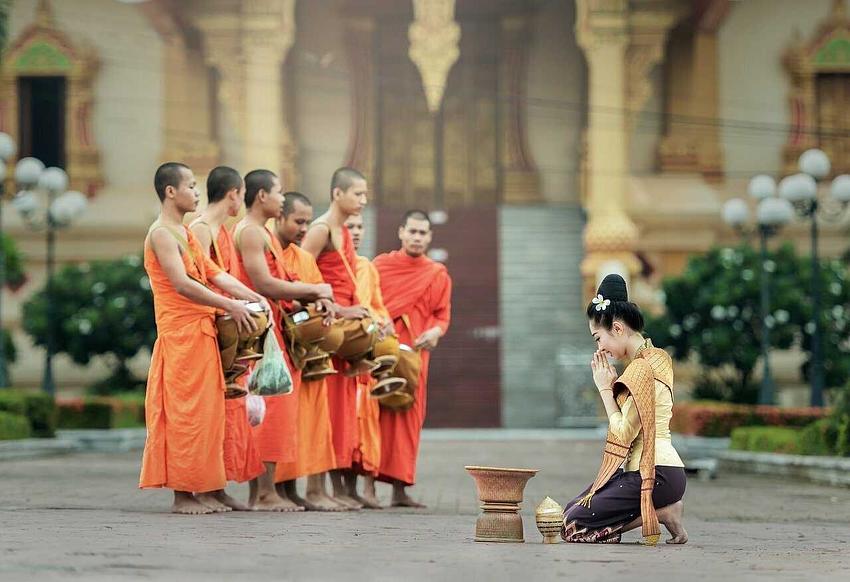Understanding the Religious Diversity of Thailand

Thailand is renowned for its vibrant culture, rich history, and breathtaking natural landscapes. An outstanding feature of Thai society is its diverse religious makeup, reflecting the inherent harmony and tolerance embraced by its people. While Buddhism stands as the primary religion, the Thai people embrace a wide array of beliefs, encompassing Hinduism, Islam, Christianity, and indigenous animist traditions. This amalgamation of faiths weaves a distinctive mosaic of spiritual practices throughout the country.
Buddhism:
Embedded in Thai culture and history, Buddhism profoundly influences the lives of the Thai people. The prevalent school, Theravada Buddhism, stresses personal enlightenment via meditation, ethical conduct, and the pursuit of wisdom. Monks, esteemed as spiritual guides, play a crucial role in maintaining and spreading Buddhist teachings. Temples, referred to as "Wat," act as sacred sanctuaries for prayer, contemplation, and communal gatherings, enhancing the spiritual essence of Thai society.
Thai Buddhism reflects a fusion of Theravada doctrines and indigenous customs, resulting in unique rituals and traditions. Merit-making ceremonies, acts of charity, and reverence for deities and spirits showcase the syncretism of Thai Buddhism, accommodating a wide array of cultural influences and regional nuances.
Hinduism:
Despite being a minority religion in Thailand, Hinduism's influence dates back to ancient times, when cultural and religious concepts from the Indian subcontinent spread across Southeast Asia. The Ramakien, Thailand's national epic, is derived from the Indian epic Ramayana, underscoring the enduring impact of Hindu mythology on Thai culture.
While Buddhism holds greater prominence, Hindu deities such as Brahma, Vishnu, and Shiva are respected in Thai religious art and architecture. Some sections of the population continue to observe Hindu rituals, particularly those associated with significant events and life passages. This underscores the enduring impact of Hinduism on Thai society.
Islam:
Islam was introduced to Thailand by Muslim traders and merchants hailing from the Middle East and the Indian subcontinent. Predominantly, it is practiced by the Malay-Muslim communities residing in southern Thailand. Islam in Thailand exhibits a syncretic nature, blending Malay cultural traditions with Islamic religious practices.
Masjids, serving as hubs for Islamic worship and learning, play a vital role in nurturing a sense of community among Thai Muslims. Festivals and rituals like Ramadan and Eid al-Fitr are enthusiastically observed and deeply woven into the cultural tapestry of southern Thailand, illustrating the coexistence of varied religious traditions across the nation.
Christianity:
Christianity made its way to Thailand through European missionaries during the colonial era, finding acceptance mainly among minority ethnic groups in the northern and northeastern regions. Although Christianity is a minority religion in Thailand, both Catholics and Protestants among its followers contribute to the nation's religious diversity.
Christian churches and organizations actively participate in social welfare initiatives, spanning education, healthcare, and community development, showcasing Christianity's constructive influence on Thai society. Despite encountering obstacles like cultural differences and resource constraints, Christian communities persevere, promoting interfaith dialogue and collaboration with other religious groups.
Indigenous Animist Traditions:
Before the advent of major world religions, Thailand harbored diverse indigenous animist traditions among ethnic minority groups residing in its mountainous areas. These animist beliefs revolve around honoring ancestral spirits, nature deities, and supernatural entities, underlining the intrinsic connection between humanity and the natural environment.
Although indigenous animist practices have waned in the face of modernization and religious assimilation, elements of these traditions persist in Thai folklore, rituals, and cultural expressions. Efforts to preserve and revitalize indigenous knowledge systems are underway, driven by grassroots initiatives and advocacy groups dedicated to safeguarding Thailand's cultural heritage.
To summarize, Thailand's religious panorama showcases a diverse array of beliefs and rituals, mirroring its historical, cultural, and ethnic intricacies. Despite Buddhism's prevalence, Thai society welcomes a multitude of faiths, cultivating an atmosphere of religious acceptance, cohabitation, and mutual esteem. As Thailand progresses into the 21st century, its religious multiplicity stands as a testament to its vigor and adaptability, enhancing the nation's cultural legacy and sense of identity.


